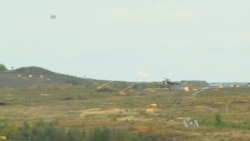The Pentagon said Tuesday that any additional Russian support of Syrian President Bashar al-Assad would be "fanning the flames" of the war in Syria.
Moves to enhance the military capabilities of the Assad government would be "counterproductive" to diplomatic efforts to end the bloody civil war, Pentagon press secretary Peter Cook said.
"For Russia to play a constructive role in this [fight against Islamic State], there has to be a political component that needs to move forward," he said.
First military contact
Cook's warning came four days after Secretary of Defense Ash Carter spoke over the phone with Russian Minister of Defense Sergei Shoygu about Russia's deepening involvement in Syria. A senior defense official said the call was "constructive" but "there was no discussion of immediate Russian activity in Syria."
"At this point we still do not have an entirely clear picture of exactly what the Russians are hoping to do in Syria," Cook told reporters.
Clearing up that picture might prove difficult, because for now, officials say there are no new military-to-military conversations scheduled between the U.S. and Russia on Syria.
When asked whether Carter thought military contacts wouldn't continue unless the Russians committed to proceed with the political process, Cook replied, "That was the message that the secretary delivered to Minister Shoygu."
Political opportunity missed?
The U.S. has repeatedly said defeating Islamic State militants in Syria requires credible partners on the ground, along with a peaceful resolution to the four-year civil war that includes Assad stepping down.
The Guardian, a British national daily newspaper, reported last week that Russia proposed that Assad could step down as part of a peace deal in 2012.
The report quoted a senior negotiator involved in back-channel discussions at the time, former Finnish President Martti Ahtisaari, as saying that Western powers failed to seize on that proposal. Since then, tens of thousands have died and millions have fled from their homes in Syria.
The Guardian reported that at the time, Ahtisaari met with Russia's permanent representative to the U.N., Vitaly Churkin.
“He said three things," Ahtissaari was quoted as saying, "One, we should not give arms to the opposition. Two, we should get a dialogue going between the opposition and Assad straight away. Three, we should find an elegant way for Assad to step aside.”
Ahtisaari said he passed on the message to the American, British and French missions at the U.N., but he told the Guardian: “Nothing happened because I think all these, and many others, were convinced that Assad would be thrown out of office in a few weeks, so there was no need to do anything.”
Ahtisaari won the Nobel Peace Prize in 2008 “for his efforts on several continents and over more than three decades to resolve international conflicts.”





